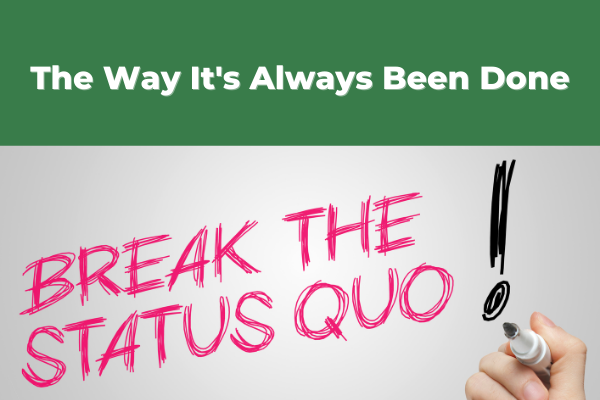Join Stop Charting at Home absolutely free & learn to leave your work at work
This week I decided to write about physicians’ relationship with status quo, specifically as it relates to medical training and culture.
This issue touches many of the others we face and I advocate that it’s time to put the mentality, “I went through it and turned out fine (but did you?), so shut your trap and put your nose to the grindstone,” to rest.
Let’s get to it!

If It Ain't Broke, Don't Fix It
Doctors are notorious for doing things a certain way simply because that’s how it’s been done in the past or that’s how it was taught to them.
The reasons for this are many, but I want to explore two of them.
First, some of this is pure indoctrination.
Our training is similar in some ways to military training—rigid hierarchies, no questioning of authority, emphasis on perfectionism, and the mental and physical toll training takes on us.
Medical training is such a unique and challenging process that med students, residents, and even young attendings rely heavily on emulation and modeling—
No, not this kind of modeling.
Yeah, still no.
There you go!
—from the more senior physicians to navigate the complex milieu of learning the science and art of medicine.
And in doing so, we pick up not only the good, but also the bad.
And since most of us are riddled with perfectionist tendencies only amplified, intensified, and rewarded through our training, we fear anything that may make us stray from the “barely acceptable good enough” we feel we’ve attained.
That anything is change or doing things differently to better our own experience and how we show up in medicine.
First Law of Motion
In addition to the indoctrination is the second point I want to raise, which is buffering to evade those same negative feelings related to perfectionism.
We keep ourselves insanely busy, partly to serve patients, but also because it affords us an excuse to not have to address the negativity of our jobs.
That may sound counterintuitive, but the fear of uncertainty and unknown discomforts outweighs a known discomfort. The path of least resistance is the status quo.
This is our inertia—constantly moving to stay put. Often a survival tactic.
Pimpin' Is Easy
And so we become entrenched in the same old, same old. It permeates our work and training culture.
Another example from training: pimping (for my non-physician readers: asking questions on-the-spot) on rounds and shaming those who don’t know answers remains a commonplace occurrence.
Some claim it’s the Socratic method. Yes, Socrates asked questions to foster critical thinking in his students, but these were open-ended questions, and the process was collaborative building to a shared understanding.
Questions on rounds are rarely open-ended. The overwhelming majority have specific answers. And the process is generally a one-way unloading of “what is correct” and “should be known.”
This is the method of information dissemination trainees learn. Since it “worked” for them, they carry on the tradition with subsequent generations of trainees, propagating the perfectionistic culture.
Breaking Out of the Matrix
It is sadly not uncommon for physician educators to tell trainees who don’t “fit the mold”—be it their sex, the way they dress, their challenging of the status quo, or their struggles with test-taking (not a true metric of what makes a good physician, mind you)—that they’ll never make it as a physician.
Ask any female surgeon, especially any who had children in med school or residency, how many times they were told it wouldn’t work out—that having a family and being a surgeon were incompatible—and that they shouldn’t even bother with training or drop out.
I count myself fortunate to know some of these badass women physicians who not only “broke the mold,” but are also trailblazing in their own right in spite of the complete lack of support they deserved as trainees.
Hell yeah, you can (and do)!
Wait, You're Saying It Is Broke(n)?
Yes. The medical system and medical culture. And it needs fixin’.
I’m always baffled when I reflect on how such intelligent, hardworking, and creative people like physicians end up feeling so powerless like cogs in a machine and yet hold on tenaciously to the established norms of the system in which they work.
Burying our heads and carrying on with business as usual got us into this mess; it’s certainly not going to get us out.
Moreover, what it means to be a physician is changing. For many, gone are the days of the lone cowboy physician whose identity is so wrapped up in doctoring that nothing is left outside of medicine.
No, many of us consider ourselves not only physicians, but also partners, parents, and multifaceted individuals whose interests and priorities are as varied and heterogeneous as we are. We did not sign up for indentured servitude.
So let’s start where we have control. Let’s start with changing this culture that doesn’t serve us and only traps us chasing the fantasy ideal that is perfection and judging ourselves and colleagues harshly.
Let’s stop doing things the way they’ve always been done.
What do you think? Do you agree that the entrenched medical culture holds us back? I’d love to hear your thoughts on this issue. Let me know in the comments section below.
If you haven’t subscribed to my email list, then do so below so you don’t miss my new posts or my weekly updates (only for subscribers).
I’d also be most appreciative if you shared this post with anyone whom you think would benefit from the content or message of the blog.
